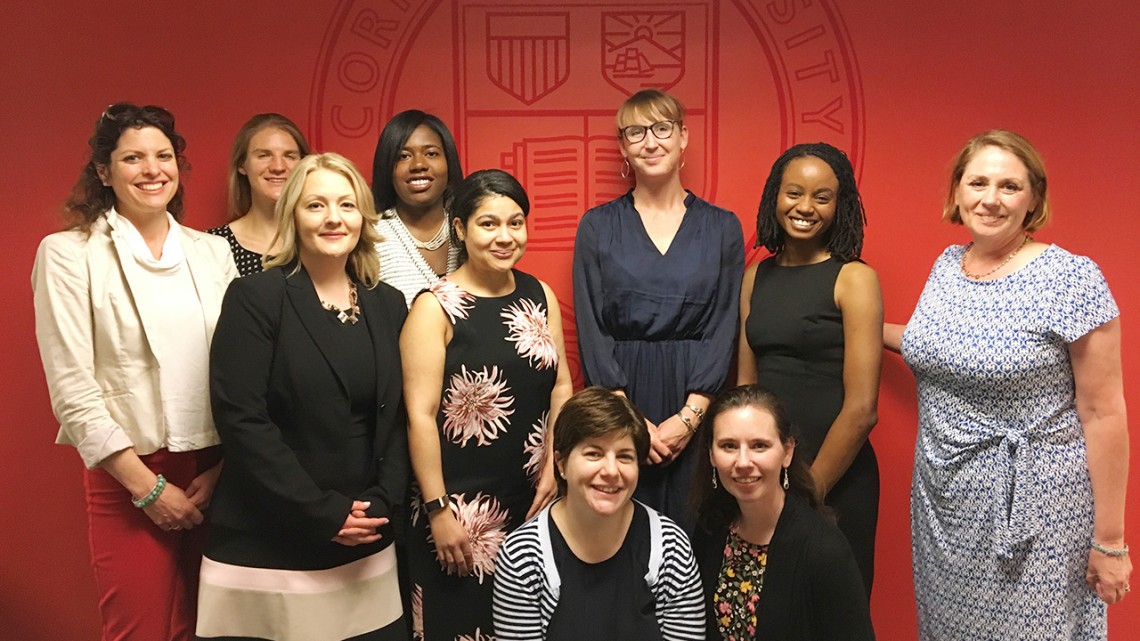
Standing from left: Josephine Martell, associate director of research development for the College of Agriculture and Life Sciences; Margaret Frank, assistant professor of plant biology; Kim Holloway, associate director of research development in the Office of Sponsored Programs; Elizabeth Johnson, assistant professor of nutritional sciences; Angela Poole, assistant professor of nutritional sciences; Kristan Reed, assistant professor of animal science; Joeva Barrow, assistant professor of nutritional sciences; Dianne Miller, senior director, Federal Relations. Bottom row from left: Fatma Baytar, assistant professor of fiber science and apparel design and Heather Huson, assistant professor of animal science.
Grant writing course for female faculty tackles funding gap
By Melanie Lefkowitz
Securing funding is critical to faculty members’ success, but research shows that women apply for fewer grants and are awarded less for their projects than men – with an even greater disparity at elite universities.
To address this imbalance, the Cornell Women’s Grant Fellows Workshop aims to familiarize female assistant professors with the landscape of federal funders, program officers and grant applications, and to teach tips for writing a winning proposal. Through workshops, panel presentations, one-on-one consultations, a community of peers and a trip to Washington, D.C., the women learn to navigate territory that can be dizzying to new faculty members.
“I feel very empowered after participating in this workshop,” said Fatma Baytar, assistant professor of fiber science and apparel design. “And I really loved working with this cohort. Even though my area is very different from what they’re doing, it’s great to see that we are sharing the same concerns.”
Josephine Martell, associate director of research development for the College of Agriculture and Life Sciences, developed the program, which she now runs with Kim Holloway, associate director of research development in the Office of Sponsored Programs (OSP). In its first year, six participants were from the College of Agriculture and Life Sciences; the remaining six were from the College of Human Ecology, the College of Arts and Sciences, and the College of Engineering.
The 2019-20 program will run Sept. 6, 2019 to Oct. 11, 2019, with a trip to Washington, D.C. in May 2020. The deadline to apply is July 1.
CALS’ faculty and academic staff is 38% female, but between 2013 and 2017 only 29% of CALS grant proposals were submitted by women, according to data from CALS. The numbers are consistent with national research showing women are less likely to apply for grants, and with studies indicating that inadequate research support is a primary reason women leave academic careers in science and technology fields.
“For me, finding out where I fit in was the hardest part,” said Elizabeth Johnson, assistant professor in nutritional sciences. “Knowing who finds your research exciting, which agencies think it’s interesting, what kind of funding mechanism you should be applying to – this course really helped with that.”
The participants said they also learned how to better promote and describe their research – a skill they may not have needed as graduate students or postdoctoral researchers.
“It’s a different form of communication that you aren’t trained in,” said Kristan Reed ’07, assistant professor in animal science. “Not just explaining what you do, but explaining it in a way that’s compelling and convinces people that it’s worth funding, which takes a different kind of mindset. You have to step back from your research a little bit.”
In addition to panel discussions with successful senior women faculty, each of the early career women was matched with a faculty member in her discipline who read and provided feedback on applications. In May, the trip to Washington, D.C., gave participants the opportunity for face-to-face meetings that helped build relationships with staff at federal agencies.
“Early-career faculty are of strategic importance to Cornell,” Holloway said. “Getting them ramped up as early as possible in their careers is a win-win, because they get research funding dollars earlier and then they are more successful in terms of getting tenure.”
A related OSP program, Research Concierge, offers all new Cornell faculty an introduction to available resources and support.
The female faculty program’s initial funding came from the President’s Council of Cornell Women, with additional funds from CALS, the Office of the Vice Provost for Research and the Office of Faculty Development and Diversity. In selecting participants, Martell and Holloway prioritized less-experienced applicants and those from underrepresented backgrounds.
Martell and Holloway said they were pleasantly surprised by how much support and encouragement participants got from each other.
“We’re in different disciplines, but we’re all in the same boat,” said Heather Huson ’97, assistant professor in animal science. “Having other people to just sit back and commiserate with sometimes, and vent, and get excited with – I think all of that is important.”
Joeva Barrow, assistant professor in nutritional sciences, said she especially appreciated a workshop on effective writing techniques. It helped her steer away from less certain language, such as “my hypothesis is,” in favor of more confident wording, like “I will define these aims.”
“As new female assistant professors,” Barrow said, “it is important to be aware of the gender bias in scientific writing. I can now confidently identify that bias and effectively remove it. This has made my applications a lot stronger.”
It’s a lesson the women can pass on to their students, said Angela Poole, assistant professor in nutritional sciences.
“I have two graduate students who happen to be women,” Poole said. “The advice I give them now is more informed, and they’ve noticed the difference. So you’ve affected the next generation, too.”
Media Contact
Get Cornell news delivered right to your inbox.
Subscribe
